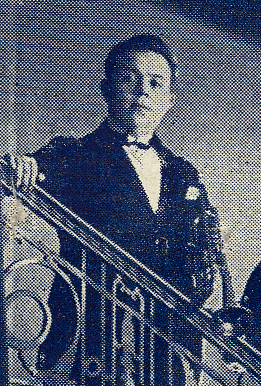- Henry Busse
Infobox musical artist
Name = Henry Busse Sr.

Img_capt = Henry Busse in 1921. Detail from sheet music cover.
Img_size = 200
Landscape =
Background = non_vocal_instrumentalist
Birth_name = Henry Busse
Alias =
Born = birth date|1894|5|19
Died = death date and age|1955|4|23|1894|5|19
Origin =Magdeburg ,Germany
Instrument =trumpet
Voice_type =
Genre =Jazz
Occupation =
Years_active =
Label =
Associated_acts =Paul Whiteman
URL =
Current_members =
Past_members =
Notable_instruments =Henry Busse Sr. (born May 19, 1894 in Magdeburg, Germany; died Apr 23, 1955 in Memphis, Tennessee) was a
jazz trumpeter known for work withsweet bands andbig band s.Early life
In 1912 at age 18, Henry Busse "jumped ship" in
New York after successfully running away from the family farm outside of Magdeburg, Germany following numerous failed attempts. There, he had been forced to play trumpet in his uncle's band after a finger he had broken was set incorrectly. In 1916, Busse came to Hollywood and worked playing trumpet in a movie theater pit band.Early career
In 1917, Busse played the trumpet with the 'Frisco "Jass" Band'. Henry Busse first made it big in 1918 with the
Paul Whiteman Orchestra, of which he was a founding member.Busse was the subject of discrimination due to his German accent, which caused concern among those living in post-
World War I America.At one point, eight out of the top ten sheet music sales spots belonged to the band. During his peak with them, Busse was earning $350 weekly, while fellow band member
Bing Crosby was earning just $150. He co-composed several of the band's early hit songs, including "Hot Lips " and (withGussie Mueller ) "Wang Wang Blues".Busse was concertmaster for the Whiteman Band when it toured Europe in the '20s and there discovered a song written by a German doctor. Back in the States, Johnny DeSilvia penned new words and the song's name was changed to "When Day is Done"; it was a hit, and made Busse famous.
While with the
Paul Whiteman Orchestra , Henry Busse played alongside brothersTommy Dorsey andJimmie Dorsey (who later left to start their own separate bands). He played withRay Bolger at theChez Paree , a night club owned by notorious gangsterAl Capone ; Busse ran the house band there and worked for Capone.uccess and controversy
Busse hit his peak in 1930-45, playing dance music before the war and swing during it. His music was often berated by Downbeat magazine, which called his a "sweet" or "Mickey Mouse" band. He and his band appeared in an MGM color movie in 1935 at Starlit days the Lido in San Francisco along with Clark Gable and MGM's stable of stars and in the movie "Lady Let's Dance", in which Busse had a speaking part.
His personal life wound up in
gossip columns when he partied one night with a woman at the Hotsy Totsy Club and woke up married. After sobering up, he sought anannulment . It took 18 months to unwind the legal tangle and a tour in Europe to stave off arrest for nonpayment ofalimony .Late career
In 1928, after mastering the English language, Busse Sr. began Henry Busse and the Shuffle Rhythm Band, which enjoyed great success in the '30s and '40s. A year later, Busse Sr. married Dorothy Drake, a former model and stage actress. Their only son, Henry Busse Jr., was born in 1931, and was 3 when his parents divorced. In 1935, Busse Sr. married Lorayne Brox, member of the Brox Sisters singing trio.
Busse stayed with Whiteman until 1928 when he left the band and formed his own group, The Henry Busse
Orchestra . This group which was more of a sweet dance band than a jazz band had a very successful career.Henry Busse and his Orchestra continued to record and perform up until his death in 1955. Busse died at an undertaker's convention at thePeabody Hotel inMemphis, Tennessee while he was playing with the Shuffle Rhythm Band.Impact
Aside from his close relationship with
Bing Crosby , he became friends with several notable people of that time, includingRay Bolger ,George Raft ,Ginger Rogers , andEdward G. Robinson .Al Hirt andHerb Alpert have remarked they were inspired by the trumpet solo work of Busse, particularly his rendition of "Rhapsody in Blue".External links
* [http://nfo.net/usa/b10.html American big bands database]
* [http://www.redhotjazz.com/henrybusse.html Red Hot Jazz]
* [http://www.imdb.com/name/nm0124435/ IMDB]
Wikimedia Foundation. 2010.
